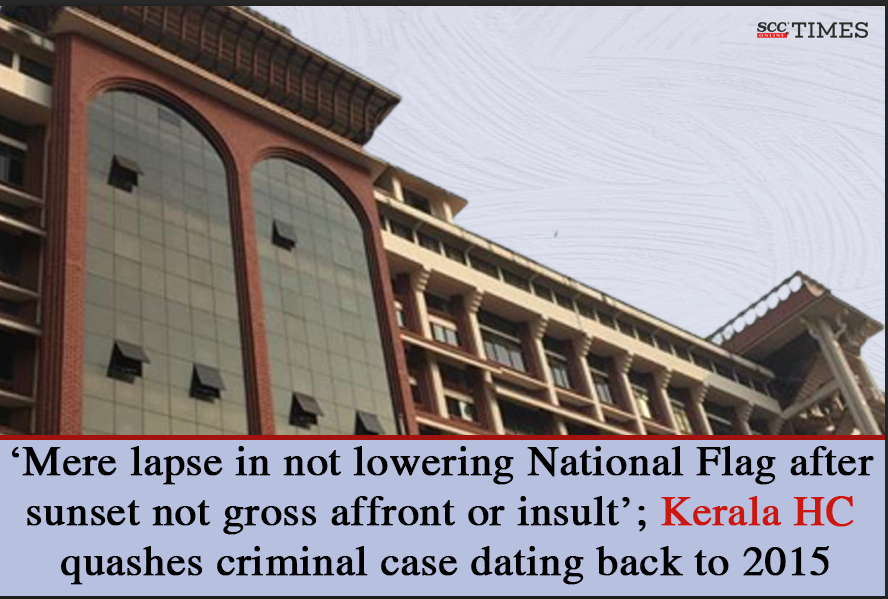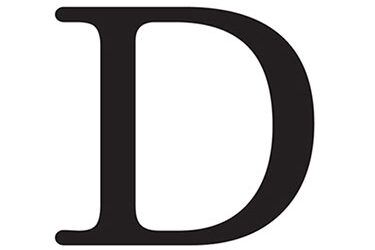Kerala HC: Not Lowering National Flag After Sunset Not an Insult

Kerala High Court: In criminal proceedings initiated against the Secretary of Angamaly Municipality for failing to lower the National Flag for nearly two days following its hoisting during Independence Day celebrations, the Single Judge Bench of Kauser Edappagath,J. held that such inaction did not amount to any of the acts specified under Section 2 of the Prevention of Insults to National Honour Act, 1971 (‘the Act of 1971’), nor did it fall within the illustrative instances provided in Explanation 4. Hence, mere lapse or inaction in not lowering the National Flag after sunset cannot be considered a gross affront, indignity, or insult to the flag. Accordingly, the Court quashed the final report and all further proceedings in the case pending before the Trial Court against the accused.
Background
The accused had been serving as the Secretary of Angamaly Municipality. The prosecution alleged that on Independence Day in 2015, the National Flag was hoisted in the compound of the Angamaly Municipality in the presence of the accused and was not lowered until 17-08-2015 at noon. The Station House Officer of Angamaly Police Station registered a suo motu FIR in the matter. A case was registered for offences punishable under Section 2(a) of the Act of 1971 read with Part-III, Section III, Rule 3.6 of the Flag Code of India, 2002 (‘the Flag Code, 2002’).
The Trial Court took the final report on file, took cognizance of the alleged offence. The accused then approached the Court by filing the present petition, seeking to quash the proceedings on the ground that the allegations in the final report, even if taken at face value and accepted in their entirety, did not First facie constitute any offence or make out a case against him.
Issue
Whether the alleged inaction on the part of the accused attracted offences under Section 2(a) of the Prevention of Insults to National Honour Act, 1971read with Part-III, Section III, Rule 3.6 of the Flag Code of India, 2002.
Analysis and Decision
The Court observed that it was not in dispute that on 15-08-2015, in the morning, in connection with Independence Day, the National Flag was hoisted in the compound of the Angamaly Municipality in the presence and with the knowledge of the accused, and that it remained hoisted until noon of 17-08-2015. According to the prosecution, the National Flag was permitted to remain hoisted only from sunrise to sunset, and the accused, being the Secretary and head of the Municipality, bore the responsibility for ensuring that the flag was lowered at sunset on 15-08-2015.
The Court noted that the right to fly the National Flag freely, with respect and dignity, was a fundamental right of a citizen under Article 19(1)(a) of the Constitution of Indiaas it constituted an expression and manifestation of one’s allegiance, pride, and sentiments toward the nation. However, the Court clarified that this fundamental right was not absolute, but rather a qualified right, subject to reasonable restrictions under Clause (2) of Article 19 of the Constitution.
The Emblems and Names (Prevention of Improper Use) Act, 1950along with the Prevention of Insults to National Honour Act, 1971regulated the use of the National Flag. In this context, the Court relied on the decision in Union of India v. Naveen Jindal & Another(2004) 2 SCC 510, to reiterate that while the right exists, it is subject to statutory control. Furthermore, Section 2 of the Act of 1971 specifically dealt with acts that amount to insults to the Indian National Flag and the Constitution of India.
The Court emphasised that, to attract the offence under Section 2 of the Prevention of Insults to National Honour Act, 1971it must be established that a person burned, mutilated, defaced, defiled, disfigured, destroyed, trampled upon, or otherwise showed disrespect to, or brought into contempt, the Indian National Flag or the Constitution of Indiaor any part thereof, either in a public place or in any other place within public view.
The Court referred to Explanation 4 of the provision, which enumerates various instances that would amount to disrespect of the National Flag. It held that the act of not lowering the National Flag after sunset did not fall within any of the actions specified under Section 2 or within the illustrative acts mentioned in Explanation 4.
The Court clarified that sub-clause (a) of Explanation 4 would apply only when a gross affront or indignity is offered to the National Flag. In the present case, the prosecution did not allege that by failing to lower the flag, the accused had offered such an affront or indignity. The Court held that a mere lapse or inaction in not lowering the National Flag after sunset could not, by itself, amount to an insult or gross disrespect.
Crucially, the Court observed that unless there is a deliberate action with the intention to insult national honour or to show disrespect to the National Flag, the provisions of the Act of 1971 would not be attracted. In the absence of any material showing Mens bad or deliberate intent on the part of the accused, the act in question could not be considered an offence under the said Act.
Further, the Court noted that the Flag Code of India, 2002 comprises executive instructions issued by the Central Government, and thus does not constitute ‘law’ within the meaning of Article 13(3)(a) of the Constitution of India. The Flag Code functions as a model code of conduct which is to be followed by all citizens, but penal consequences cannot be imposed unless there exists a specific statutory provision for the same. In support of this reasoning, the Court cited Satheesh babu pk. v. State of Kerala.1
The Court concluded that, as a result of the foregoing discussion, even if the entire allegations contained in the final report, along with the materials collected during investigation forming part of the said report, were accepted in their entirety, no offence under Section 2(a) of the Prevention of Insults to National Honour Act, 1971read with Part-III, Section III, Rule 3.6 of the Flag Code of India, 2002, was made out against the accused.
It held that no useful purpose would be served by allowing the criminal prosecution against the accused to continue. Accordingly, the Court quashed the final report and all further proceedings in the case pending before the Trial Court.
[Vinu C Kunjappan v. State of Kerala, CRL.MC NO. 9251 OF 2019, decided on 29-07-2025]
Advocates who appeared in this case:
For Petitioner: S.Rejeev, kkdherendrakrishnan, v.vinay, D.Feroze, Anand Kalyanakrishnan
For Respondent: Sangeetha raj.nr-pp

